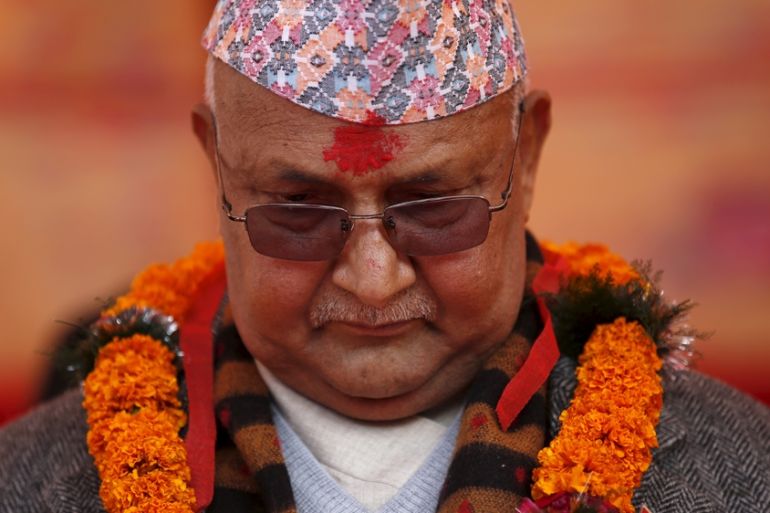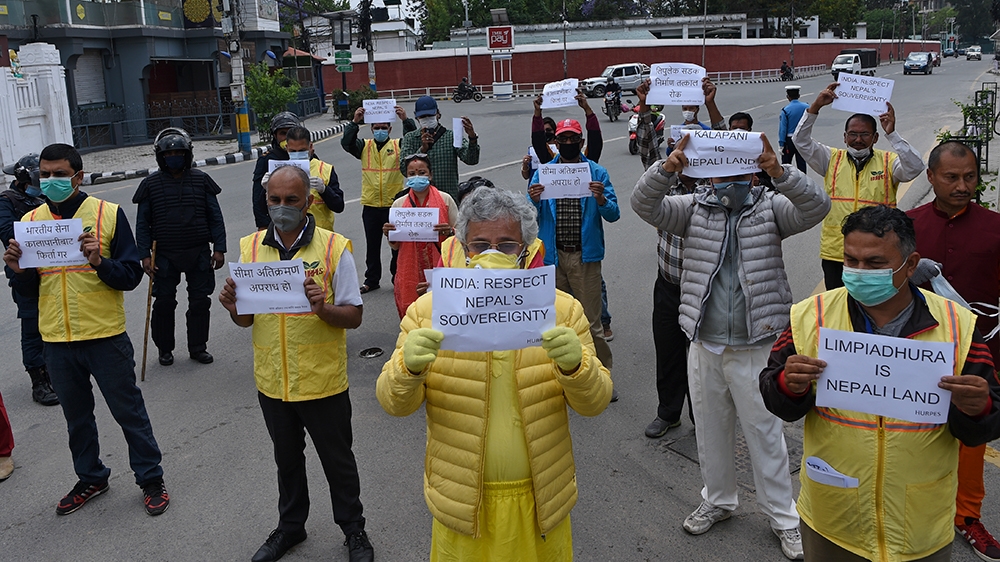‘Cultural encroachment’: PM Oli says Hindu deity Ram from Nepal
Nepal PM says Ayodhya as Lord Ram’s birthplace is a recent creation, as he accuses New Delhi of ‘cultural encroachment’.

Nepali Prime Minister Khadga Prasad Sharma Oli has said that Hindu deity Ram was born in the Himalayan nation and not India, as he accused New Delhi of “encroaching on cultural facts” amid frayed diplomatic relations between the two South Asian neighbours.
“We have been oppressed a bit culturally. Facts have been encroached,” Oli said at a function at his residence in the capital, Kathmandu, on Monday, according to Nepali news website setopati.com.
According to Hindu mythology, Lord Ram was born in Ayodhya town located in the northern Indian state of Uttar Pradesh and married to Sita from Janakpur located in present-day Nepal.
But the 68-year-old leader claimed Ayodhya is a village to the west of the Nepali border town of Birgunj. He added that Ayodhya in Uttar Pradesh, about 135km from state capital Lucknow, is a more recent creation of India’s.

“We still believe that we gave Sita to Indian Prince Ram. But we gave to the prince from Ayodhya, not India. Ayodhya is a village a little west to Birgunj, not the Ayodhya created now,” he was quoted as saying by setopati.com.
India’s Hindu far-right believe Ram was born at the site of a medieval-era mosque. The Babri mosque was demolished by a Hindu mob in 1992. Last year India’s Supreme Court gave the disputed land to Hindus to build a Ram Temple, asking Muslims to build a mosque far from the site.
On Tuesday, Nepal’s foreign ministry sought to clarify Oli’s comments.
“As there have been several myths and references about Shri Ram and the places associated with him, the prime minister was simply highlighting the importance of further studies and research of the vast cultural geography the Ramayana represents to obtain facts about Shri Ram, Ramayana and the various places linked to this rich civilization,” the ministry said in a statement.
“The remarks were not meant to debasing the significance of Ayodhya and the cultural value it bears.”
Border dispute
The Nepali prime minister has attacked India several times since a diplomatic row erupted on May 8 when New Delhi inaugurated a Himalayan road link passing through the disputed territory of Kalapani. Nepal opposes a controversial Indian map published last November that showed Kalapani in India.
Last month, Nepal’s parliament approved a new political map, showing Kalapani, Lipulekh and Limpiyadhura within its borders, drawing strong reactions from India.
Oli has in the past accused New Delhi of conspiring to topple his government, and last week banned private Indian channels for “character assassination” and airing “false propaganda”.
Analysts say Oli’s tirade against India likely aims to divert attention from domestic political troubles. Senior leaders from his ruling National Communist Party (NCP) have been seeking his resignation over his leadership style and governance failure. He has also faced the ire of the people for his handling of the coronavirus crisis.
The Nepali prime minister has also accused India of spreading the coronavirus pandemic into his country.
Senior NCP leaders have also criticised Oli’s anti-India remarks that were deemed “neither politically correct nor diplomatically appropriate”.
A spokesman from India’s ruling Bharatiya Janata Party (BJP) has criticised Oli and accused the left parties of “playing with peoples’ faith”.
“Lord Ram is a matter of faith for us, and people will not allow anybody, be it prime minister of Nepal or anyone, to play with this,” Bizay Sonkar Shastri told the Times of India newspaper.
